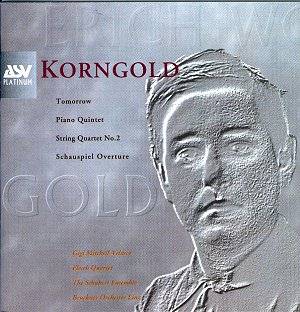Another interesting ASV repackaging, this time centred
on the relatively unfamiliar chamber works of Erich Wolfgang Korngold
best known for his Warner Bros film scores of the 1930s and 1940s.
The Piano Quintet is a substantial three-movement work
with a very demanding piano part. Typical of the composer, much of it
is warm and good-humoured with, in the opening movement, upward-sweeping
optimistic figures, but also a contrasting shadowy, central section
with mysterious dissonances. The central movement is harmonically arresting
and is based on a set of variations from an introspective romantic theme
from Korngold’s Lieder des Abschieds (‘Songs of Farewell’). The
finale begins sternly but proceeds in sunshine and good humour with
the sort of music that anticipates the more rumbustious episodes of
his The Adventures of Robin Hood film score. The Schubert Ensemble
deliver a convincing performance of considerable charm and polish.
Korngold’s String Quartet No.2 in E flat opens with
reflections on a summer-lit Austrian countryside with passages of lyrical
serenity contrasted with more joyful, bustling material. The second
movement Intermezzo is pleasant salon music with significant solo parts
and interplay between the individual voices. The emotional heart of
the work is the lovely Larghetto (Lento) third movement beginning with
intriguing string glissandi, misterioso, leading to deeply introspective
musings affectingly played by the Flesch Quartet. The concluding movement
is a set of variations on a Viennese waltz.
The two chamber works are book-ended by two works written
on a larger scale. The Schauspiel Overture (‘Overture to a Drama’) was
composed when Korngold was only 14.
Despite a tendency towards immature bombast, it shows
amazing assurance and command of the resources of a large orchestra
and understanding of structure and dramatic tension. Richter splendidly
realises the work’s colour and the heroics, writ large in the grand
Richard Strauss manner.
Tomorrow was written for the film The Constant
Nymph for orchestra, female choir and mezzo-soprano soloist.
It is a small-scale symphonic poem and to be frank it is not top-drawer
Korngold. It’s all too melodramatic - even for Korngold and on this
evidence one can see why some wags (unjustifiably) criticised the whole
of Korngold’s output as being more corn than gold. Its sombre opening
is in the manner of a marche funèbre with tolling bells
recalling his operas Die tote Stadt and Violanta. It then
proceeds in autumnal nostalgia as the (doomed) soloist sings: "When
I am gone, The sun will rise as bright tomorrow morn … Beauty will live
..." To their credit, Richter and his performers make this tear-jerking
work as convincing as they can.
Another valuable re-packaging – the two chamber works
being especially welcome.
Ian Lace


